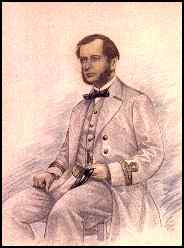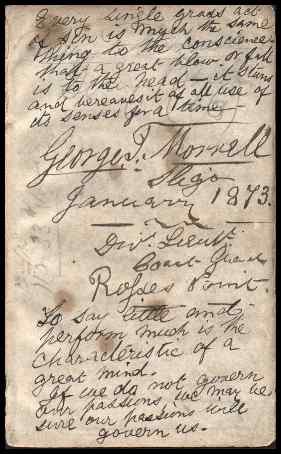
It was, and still is, common custom in the navy for officers, petty
officers, and ratings to keep diaries and log books of all sorts. One such diary had
belonged to George Truman Morrell, in 1873, and he used it during his last year of service
at sea. This diary detailing his life and experience for this one year has recently been
located.
In that year, George held the rank of lieutenant in the Royal Navy, but was in fact in the employ of the coast guard, assigned to the Sligo station at Rosses Point, in northwest Ireland. George had been with the coast guard since 1869, following a brief period in August of the same year aboard HMS Trafalgar, a training ship.
His duties with the coast guard would have included responding to ships in distress and investigating wrecks in the area near Co. Sligo. The coast guard had been under Admiralty control since 1858, and formed part of the reserves. George had already spent over 20 years in the navy, and was at the end of his useful career, but probably was sought-after by the coast guard for his sea and command experience. He lasted only four years in the coast guard before retiring at the rank of Commander in 1873.
The diary described above appears to have been a day-to-day account of George's final year with the coast guard. It not only included notes and reminders regarding daily life and activities, but also included grammar lessons, religious scriptures, and humourous anecdotes. From this, it can perhaps be speculated that George was teaching grammar to his children, or perhaps his crew, and that he was a deeply religious man.
 The diary itself is a small green leather-bound book,
six inches tall by three and three-quarter inches wide. It is a pre-printed almanac titled
"Campbell's Commercial Almanac for 1873" published by Duncan Campbell & Son,
98 St. Vincent St., Glasgow, Scotland. It is well worn, and the binding has come detached.
The diary itself is a small green leather-bound book,
six inches tall by three and three-quarter inches wide. It is a pre-printed almanac titled
"Campbell's Commercial Almanac for 1873" published by Duncan Campbell & Son,
98 St. Vincent St., Glasgow, Scotland. It is well worn, and the binding has come detached.
The book contains pre-printed pages detailing information about the government of Great Britain during the period (Royal House, peers, members of parliament, postage and duty rates, etc.). The second half contains daily diary pages which are filled in by the user. George's writing appears throughout the entire book, in margins, blank pages, note pages, inside covers, etc. It also contained three pieces of paper in an inside cover pocket, which will be described later.
The inside cover page for the diary reads,
George T. Morrell
Sligo
January 1873
Div. Lieut.
Coast Guard
Rofses Point
The title page also includes two brief, inspiring passages which were no doubt indicative of George's character and motivation. The first reads,
"Every single gross act of sin is much the same thing to the conscience that a great blow or fall is to the head - it stuns and bereaves it of all use of its senses for a time."
The second, perhaps more poignant, reads,
"To say little and perform much is the characteristic of a great mind. If we do not govern our passions, we may be sure our passion will govern us."
Several other interesting notes appear on the dated diary pages, reporting notable events.
Sunday 5th January - William Fisher Boat , 15 Tons, belong (illegible) Peterhead, Belium (sic) to Peter McDonnell. Off Isle of Man was run down by a steamer. Taken into Newcastle by the "William" schooner of Red Bay. Schooner landed him at Killybegs. Peter McDonnell lost his son a lad of 12 - Master of her.
Wednesday 8th January - Visited Reilly. Investigating complaint against Newton.
Wednesday 29th January - "43 years of age."
Tuesday 25th February - A mate - Mr. Gunning - No pilot when she struck - Pilots name Bareley [illegible] not making water
Thursday 27th February - Wern - Schooner 66 tons from Liverpool - 14 days - M S Peak, Crew 4. Not insured - Cargo manure 115.16 [illegible] 11 pm [illegible] struck on the south side. Belong Mr. McClure, Glasgow [illegible] 1000£ value of ship. 1500£ value cargo.
Monday 30th June - Bodies of two young women aged about 16 & 18 both sweetly pretty, laying in our boat house, having been brought off Black rocks near L. House on Saturday, to await Coroner's inquest on Monday 30th June.
Tuesday 9th September - Mr. King to lose one good conduct stripe.
The remainder of the diary goes into extensive and tedious detail of contemporary grammar convention, as well as some religious scripture, and humour of the times.
The three annexed papers found within the inside cover pocket were a printed page, reprinting a letter to the editor of the Sligo Chronicle of 9 October 1858 describing the state of the Sligo harbour works.
The second item appears to be a Q & A sheet for an oral exam in navigation and seamanship. It includes such questions, and answers, as:
Q. Why should not all the men sit to windward to trim a boat?
A. Because if the wind suddenly fell, the boat might be upset.
The third and final document appears to be a lengthy letter to a superior outlining a case for increased retirement pay, written on logbook paper.
The paper, ink and writing in the diary, and in the included documents are remarkably well-preserved, considering they are over 127 years old.
As other documents and information come to light, they will be posted as well. However, this diary gives a brief insight into George's final year of service at sea, and a glimpse of his personality and conduct.